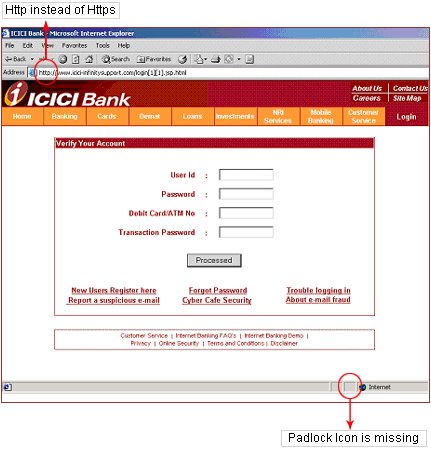Bank Phishing..! Is someone fishing for your personal Information?

Bank Phishing..! Is someone fishing for your personal Information
Don's take the phishing bait!
What do you do when you come across emails that seem suspicious? Phishing is a type of fraud that involves stealing personal information such as Customer ID,IPIN, Credit/Debit Card Number, CVV number etc. through emails that appearto befrom a legitimate source. Nowadays, Phishers also use phone(voice phishing) and SMS(smishing).
How do frauders operate?
1. Fraudsters pose as bank officials and send fake emails to customers,asking them to urgently verify or update their account information by clicking on a link in the emails.
2. Clicking on the link diverts the customers to a fake website that looks like the official bank website- with a web form to fill in his/her personal Information
3.Information so acquired is then used to conduct fraudulent transactions on the customer accounts.

1. Verify the URL of the Webpage. The 's' at the end of 'https://" stands for 'Secure'. Meaning the page is secured with an encryption. Most fake web addresses start with 'http://'. Beware of such websites !
2. Check the Padlock Symbol. This depicts the existence of a security cerificate, also called the digital certificate for that website.
3.Establish the authenticity of the website by verifying its digital certificate. To do so, go to file > Properties > Certificate or double click on the Padlock symbol at the upper right or bottom corner of your browser window.

How to protect yourself from phishing ?
Dos:
1. Always check the web address carefully.
2. For Logging in, always type the website address in your web browser address bar.
3.Always check for the padlock icon at the upper or bottom right corner of the webpage to be 'On'
4. Install the Net Protector Antivirus on your Computer to protect yourself.
5. Always use non-admin user ID for routine work on your computer.
Dont's:
1. DO NOT click on any suspicious link in your email.
2.DO NOT provide any confidential information via email, even if the request seems to be from authorities like Income Tax Department, Visa or MasterCard etc.
3. DO NOT open unexpected email attachment or instant message download links.
4.DO NOT access NetBanking or make a payments using your Credit/Debit from Computers in public places like cyber cafes or even from unprotected mobile phones.






